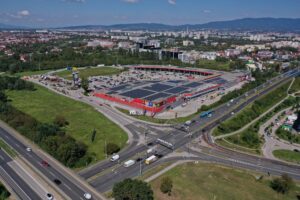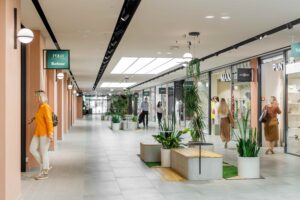Retail parks have proven to be highly resilient to the challenges posed by the rise of online shopping, as well as in comparison to traditional shopping malls, especially in smaller communities, Markus Pinggera, CEO of Supernova Group, says for Diplomacy&Commerce. We also talked about the plans in Croatia as well as the markets in which they operate, and also about consumer habits and their needs.

- The Supernova Group is based in Austria, and you have successfully implemented more than 200 projects in Austria, Croatia, Slovenia, Slovakia, and Romania. Although all markets are part of the EU, how would you rate business in the mentioned markets, and what are the differences between them?
The operations of the Supernova Group in various EU countries bring unique challenges and opportunities. While all these markets are part of the EU’s common market, each has its specific characteristics. Austria is generally characterized by a very high density of retail. Due to the increasing restrictions imposed by the authorities, it is de facto impossible to undertake new Greenfield developments. We have therefore driven our expansion in Austria through acquisitions. Nevertheless, the Austrian market is very stable, which is also reflected in the sales figures of our tenants.
In Croatia, Slovenia, Slovakia, and Romania, despite these countries also being part of the EU, there are differences in consumer behavior, local regulatory frameworks, and market structures. For instance, in Croatia, we have seen saturation in the large shopping mall segment in recent years, which led us to shift our focus toward retail parks in smaller towns. These parks have proven to be highly resilient and are in high demand among the local population.
Romania was and still is one of the countries with the highest potential both in trade and in the development of new projects. Especially during the pandemic, Romania was the country that was least affected compared to the other countries of the former Eastern bloc. There is a great need for modern shopping facilities in the form of retail parks, especially in medium-sized cities.
Additionally, in Austria, Slovenia, and Croatia, there is a noticeable shift towards higher quality offerings, with visitors seeking not only shopping but also entertainment and hospitality. Our Centar Kaptol in Zagreb is organized around this concept. It is the first center in Croatia with a premium offer that places equal emphasis on shopping and lifestyle.
- Is the Supernova Group planning additional expansion, and what are your guidelines or parameters when determining which markets to expand your business into?
The Supernova Group is always seeking opportunities for further growth, but we focus on sustainable projects and stable market conditions. When evaluating new markets, key parameters include economic growth, consumer demand, local regulations, and long-term real estate prospects. The most important aspects, however, are the expansion plans of our anchor tenants and their sales performance in the respective country. Our only source of income is rental income. The success of the retailers is therefore also very closely linked to our future income from rents. If a retailer is not successful, it cannot pay adequate rents. We have therefore often combined market entries with those of international tenants. The second important factor is the legal framework in the countries. Land costs, construction prices and also the legal requirements are a key factor. The third factor is the financing conditions. Which banks are prepared to finance retail projects and under what conditions? In Italy, for example, it is currently almost impossible to find a bank that finances retail. Sometimes for incomprehensible reasons.

- What are your plans in Croatia, given that, in addition to large shopping malls, you are also investing heavily in retail parks?
In our view, the potential in large to medium-sized cities has already been completely exhausted and no longer allows for any meaningful expansion. What we are seeing now is that development is starting in small towns and this is associated with increasing risk. The costs for a retail park (financing, construction and property costs) are no lower than in larger cities. On the other hand, tenants in these city sizes are not prepared to pay the rents to generate a reasonable yield. We have therefore also switched to acquisitions in Croatia, but this does not mean that we are not always reviewing sensible options. Just a few days ago, we opened our new retail park in Jastrebarsko, near Zagreb. Supernova Jastrebarsko spans 4,673 square meters, and in addition to boosting the economic growth of Jastrebarsko and the surrounding areas, it will improve the daily lives of local residents by offering practical, affordable, and diverse shopping options.
- How competitive are retail parks compared to large shopping malls and the growing number of online stores? How do you respond to these new trends and consumer habits?
The key advantage of retail parks is the ability to quickly access each store, reducing the need to pass through large shared spaces—something that was especially valued during the pandemic. The biggest advantage, however, is for the tenants. Both the rents and the ancillary costs of a retail park are significantly lower than those of a shopping center. If you calculate average ancillary costs of around €5 to €6 for a mall, they are around €2.5 for a retail park. A retail park therefore makes more sense than a shopping mall, especially if retailers in small towns have lower sales estimations. It can also be seen as a risk minimization for both the developer and the retailer. Otherwise, the trend in malls in recent years has been towards entertainment and gastronomy. The combination with the shopping experience is becoming increasingly important. However, the proportion of gastronomy and entertainment is significant. A few years ago, big food courts and jump parks were seen as the savior, but it has become clear that the failure rate for these tenants is very high and that letting is sometimes very complex and expensive.

- How do you assess the retail industry in Croatia, and can we expect stagnation, decline, or market growth in the future? In which direction do you think it will develop?
We believe that the retail industry in Croatia will continue to grow, with a particular focus on sectors such as retail parks. I think that the retail industry in Croatia still has a lot of room for improvement. Areas outside the major urban centers in particular have development potential. However, we are also seeing a trend that is already on the rise in other countries, namely the tendency towards discount and “price-value” retailers. Whereas we used to see upscale brands in city centers, brands such as Tedi, KIK and Action are being seen increasingly more often. We therefore expect stable growth, but with the necessary evolution of offerings to meet the needs of modern consumers.
- What are your plans for 2025, and how much does the unstable environment (inflation, wars) affect the realization of these plans?
Although global crises such as inflation and wars may cause short-term challenges, our focus for 2025 remains on long-term development, innovation, and improving the experiences at our existing centers. However, it is above all the longer-term problems that affect both us and the retail companies. In addition to the inflation already mentioned, it is above all the increases in labor costs and logistics costs (due to the more difficult passage through the Red Sea) that are also having a major impact on retailers. This means that uncertainty is still very high because nobody knows what tomorrow will bring. It is essential to act with foresight. As far as development is concerned, construction costs are still at pre-war levels. But financing costs also continue to have a negative impact on the property sector.
- As an international real estate company with over 20 years of experience, you see yourselves as a developer of sustainable growth and bear a special responsibility towards stakeholders, the environment, and society. What does your ESG strategy consist of, and what are its goals?
From the very beginning, and especially in recent years, Supernova Group has been focused on a green future. The foundation of responsible business towards our stakeholders, society, and the environment lies in sustainable and environmentally friendly development, supported by the Supernova Green Energy sustainability program. Our goals include reducing the carbon footprint of our properties, using renewable energy sources, and developing green spaces within and around our centers, with the aim of achieving complete carbon neutrality by 2028.
The Supernova Green Energy program also includes installing photovoltaic systems to produce our own electricity on the roofs of our centers. In Slovenia, Austria, and Croatia, 35 solar power plants have already been implemented on the roofs of shopping centers, producing 23,400 MWh of green energy per year. Over the next two years, the group plans to expand the installation of solar panels to all remaining shopping centers where it is technically feasible. In terms of our sustainability achievements, I would like to highlight that the Supernova Group now has a total of eight centers in Croatia with the prestigious BREEAM certification, which confirms our commitment to environmentally friendly and sustainable spaces.
We also value our contribution to local communities by creating jobs and supporting local initiatives. We believe that long-term sustainability is not just a corporate responsibility but also a business necessity that benefits both us and the communities in which we operate.